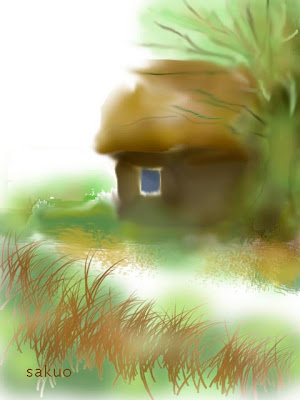Kamakura--
these days scarecrows
are the gatekeepers
kamakura ya ima wa kagashi no yashiki mori
.鎌倉や今はかがしの屋敷守
by Issa, 1792
This is Issa's earliest haiku that we have on the subject of scarecrows. The "gatekeepers" (yashiki mori) might also be translated, "keepers of the mansions." Kamakura is one of Japan's ancient capitals, on Sagami Bay southwest of Tokyo. http://cat.xula.edu/issa/
sakuo comment.
1792 Issa was 30 years old.
Third Month, 25th day, Issa start on a journey to Shikoku Island.
In a few days, he reached at Kamakura and saw the old mansion of Minamoto Yotitomo, http://en.wikipedia.org/wiki/Minamoto_no_Yoritomo
who is the first Syogun and the founder of Government by warrior.
sakuo haiga


















































